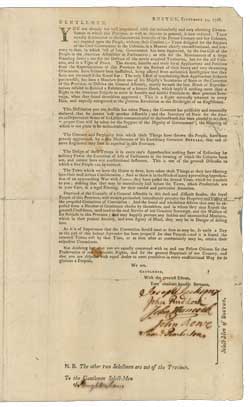“A pretence for arming the Town”
We pick up the proceedings of Boston’s town meeting on 13 Sept 1768 after the voters present unanimously approved a call for a Convention of representatives from all of Massachusetts’s towns.
According to Gov. Francis Bernard’s report to the Earl of Hillsborough in London:
Gov. Bernard saw through the ruse:
The meeting wrapped up with three votes:
On 14 September—250 years ago today—Boston’s selectmen sent the broadside shown above to the other towns in Massachusetts, inviting them to a Convention in Faneuil Hall eight days later.
TOMORROW: Back to Beacon Hill.
According to Gov. Francis Bernard’s report to the Earl of Hillsborough in London:
I should have mentioned before that in the middle of the Hall where they met, were deposited in chests, the Town Arms, amounting as it is said to about 400. These, as I have before informed your Lordship, about 4 or 5 months ago were taken out of the lumber rooms, where they had lain for some years past, to be cleaned; & have since been laid upon the floor of the Town hall to remind the people of the use of them. These Arms were often the subject of discourse & were of singular use to the Orators in the way of Action.The resolution Boston’s Whig leaders next offered indeed related to such weapons as they proposed making sure the town’s militiamen were all armed:
Whereas, by an Act of Parliament of the First of King William and Queen Mary it is declared that the Subjects being Protestants, may have Arms for their Defence; It is the Opinion of this Town, that the said Declaration is founded in Nature Reason and sound Policy, and is well adapted for the necessary defence of the Community And for as much as by a good and wholesome Law of this Province, every listed Soldier, and other Householder (except [horse] Troopers who by Law are to be otherwise provided) shall be always provided with a well fixed Fire Lock Musket Accoutrement and Ammunition as in said Law particularly mentioned, to the satisfaction of the Commission Officers of the Company; and as there is at this Time a prevailing apprehension, in the Minds of many, of an approaching War with France: In order that the Inhabitants of this Town may be prepared in case of sudden danger; Voted, that those of the said Inhabitants who may at present be unprovided, be and hereby are requested duly to observe the said Law at this Time“An approaching War with France”? Indeed, the 8 September Boston News-Letter had just carried a couple of alarming items from London:
By a Gentleman just arrived from Calais we are informed, that the common topick of conversation at that place, Dunkirk and other sea ports in France, is of an approaching war with England. . . .But if the Whigs were really worried about another French war, why were they objecting to the arrival of British regiments? Surely the people of Massachusetts would welcome their own nation’s professional military protection.
One day last week, at a certain Coffee-House not 100 miles from St. James’s, a wager of 1000 guineas to 20, was laid that war would be declared between Great Britain on the one part, and France and Genoa on the other, before the 3d day of August next.
Gov. Bernard saw through the ruse:
As the Subject of their debates turned upon arming the Town & Country against their Enemies, The probability of a French War was mentioned as a pretence for arming the Town & a Cover for the frequent use of the Word Enemy.After this discussion, the resolution about military preparation passed “by a very great Majority.” The earlier votes were unanimous, which meant there were some brave dissenters in the meeting.
It was said that the Enemy would probably be here before the Convention met, that is within 10 days; It was moved that the Arms should be now delivered out to oppose the Enemy; this was objected to for that they might fall into hands who would not use them.
But this flimsy Veil was not allways kept on: it was often said that they had a right to oppose with arms a military force which was sent to oblige them to submit to unconstitutional Laws; and when it was required to be more explicit, the Chairman [James Otis, Jr.] said that they understood one another Very well, & pointing with his hand added “there are the Arms; when an attempt is made agst. your liberties they will be delivered; our Declaration wants no explication:” and indeed it does not.
The meeting wrapped up with three votes:
- Thomas Cushing shared a letter from New York merchants supporting non-importation, and the gathering voiced its approval.
- The town asked local ministers to set aside the next Tuesday “as a Day of Fasting and Prayer.”
- The town decided for the proceedings of this meeting to be “published in the several News Papers; and also that a Number of Copys be struck off & sent to the several Towns in this Province.”
On 14 September—250 years ago today—Boston’s selectmen sent the broadside shown above to the other towns in Massachusetts, inviting them to a Convention in Faneuil Hall eight days later.
TOMORROW: Back to Beacon Hill.


No comments:
Post a Comment